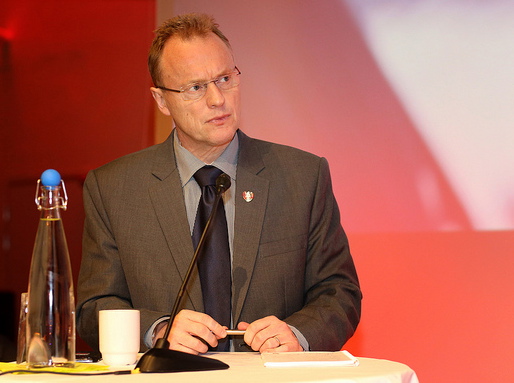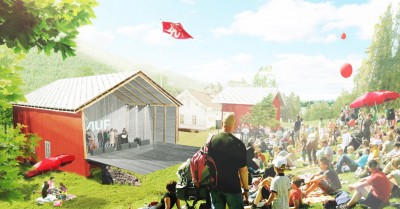With the third anniversary of Norway’s July 22 terror attacks in 2011 on the horizon, Labour Party (Arbeiderpartiet, Ap) Secretary Raymond Johansen worries there’s been a part of the debate left untouched. Johansen told a local magazine this week that the party did not want to be accused of politically capitalizing on the attacks, but it was time to discuss the fact that Anders Behring Breivik’s main target was the Labour Party itself and its policies.

Johansen thinks it’s now time to talk about the hatred Breivik stood for. In the latest issue of the Journal of the Norwegian Psychological Association (Tidsskrift for norsk psykologforening), he explained the rage and frustration that existed within the party immediately following the attacks, but which wasn’t allowed to play out in the public sphere.
“Breivik was actually a facist who hated the Labour Party and the party’s leaders,” Johansen said. “I myself stood in the top 10 on his kill list. He went to (the island of) Utøya (were Labour held its annual youth summer camp) to kill young people and behead the leader of AUF (Labour’s youth organization) Eskil Pedersen. The party has spoken little about this hatred, out of fear of being accused of making political capital out of the terror attacks. We have gone too far in downplaying what the culprit actually stood for.”
Newspaper Aftenposten reported that Labour’s line in the years following the attacks has always been that the attacks were against Norwegian society and fundamental democratic values. Johansen said Breivik’s hatred is also an important part of the political debate, but difficult to talk about until now. Johansen believes it nonetheless can be addressed, “because the hate is the common denominator of the fascist movements that are now emerging in Europe,” he explained. “We also see it in Norway, on websites and in comment fields. A strong hatred against everything the Labour Party stands for.”
Sinister development
Breivik’s defense lawyer Geir Lippestad, a member of the Labour Party himself, agreed it was time to address the rise of far-right extremism. “Together with increasing inequality and poverty, it is a very sinister development,” he told Aftenposten. “A generation of youth struggling to find work, education and housing. This gives fertile ground for all kinds of radicalization.
“Also in Norway we must be on guard against the attitudes that right-wing extremists carry,” Lippestad continued. “For too long we have been afraid to talk about racism and prejudice, for fear of not being tolerant of others’ beliefs.”
He argued that wealthy Norwegians are in danger of becoming blind to the war, need and poverty faced by other societies. “Instead of seeing our responsibility to help and the opportunities immigration gives, it is the fear of the unknown that wins out in debates. An example of this is the attitude towards poor Europeans who come to Norway to try to find a livelihood for themselves and their families. It has become totally acceptable to say that we don’t want to help these people with a minimum of shelter from cold and hunger when they are here, because then more might come.”
Not ignored
Aftenposten’s political editor Harald Stanghelle argued Johansen was mistaken if he believed Norwegians had ignored the extremist motivations behind the attacks. Debate has in fact been lively, if not within the Labour Party itself.
“Anders Behring Breivik affected us as people, but his stated main target was the Labour Party,” Stanghelle wrote on Thursday. “Raymond Johansen has that absolutely right.” New party leader Jonas Gahr Støre has also acknowledged, though, that Labour was the target of both the massacre at AUF’s summer camp on Utøya and the bombing of government headquarters in Oslo.
While Stanghelle wrote that the hatred was intense and others definitely shared Breivik’s views, he denied there had been any downplaying of what the terrorist stood for. “It’s just as correct to say that attitudes that previously only existed in the internet’s darkest echo chambers are now floodlit,” Stanghelle wrote. “They are discussed and can be met in the open. Attitudes are identified and analyzed. More clearly than before they meet resistance, because they are now taken more seriously.”
New Utøya
Meanwhile, AUF has backed away from plans to tear down what was known as the “café building” on Utøya, where 13 AUF campers were gunned down. Leader Eskil Pedersen said it was “unthinkable” to return the affected parts of the building to normal activity, and admitted he and other AUF officials had moved too quickly with the plans for a new Utøya.

“We have never had any desire to forget July 22, and delete this from Utøya’s history,” Pedersen said. “I see that tearing down the parts of the building which have visible traces would be a mistake.” He said the decision to demolish the café had been made in 2012 and had widespread support at the time, but doubts later emerged. Memorial plans marking the massacre have also been controversial.
“We want a place that affected families, survivors and others can visit,” he explained. “In the future it can maybe become a sort of learning center in the fight against racism. But we have not come so far with exactly how the building should be designed.” A pump house where 14 people were shot will also remain standing.
Pedersen said he hoped the new Utøya would be ready for the fourth anniversary of the attacks and the young Labour summer camp in 2015. “I think very many are clear that we should not let Utøya lie deserted, but begin to use it again,” he said. “That does not mean that the first summer camp is going to be a normal summer camp. It is going to be very different, because it will be the first summer camp on Utøya since 2011.”
newsinenglish.no/Emily Woodgate

